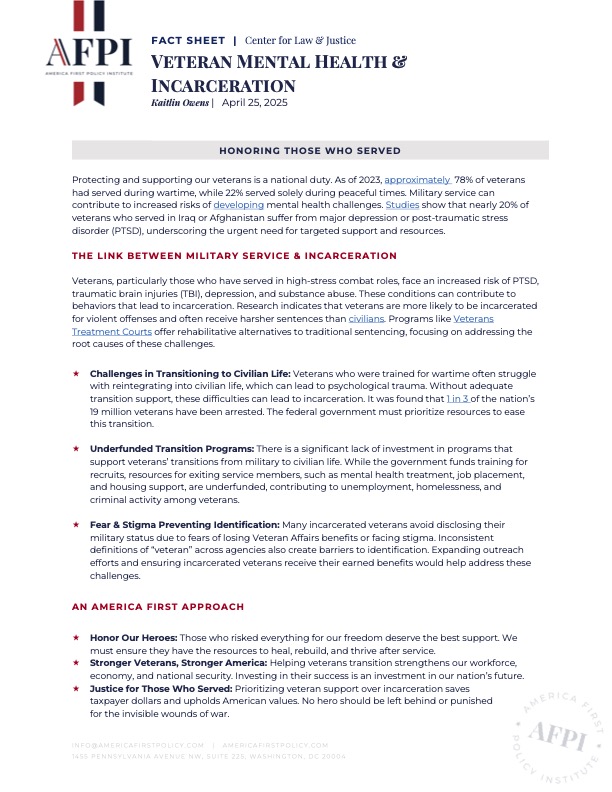Veteran Mental Health & Incarceration
Protecting and supporting our veterans is a national duty. As of 2023, approximately 78% of veterans had served during wartime, while 22% served solely during peaceful times. Military service can contribute to increased risks of developing mental health challenges. Studies show that nearly 20% of veterans who served in Iraq or Afghanistan suffer from major depression or post-traumatic stress disorder (PTSD), underscoring the urgent need for targeted support and resources.
THE LINK BETWEEN MILITARY SERVICE & INCARCERATION
Veterans, particularly those who have served in high-stress combat roles, face an increased risk of PTSD, traumatic brain injuries (TBI), depression, and substance abuse. These conditions can contribute to behaviors that lead to incarceration. Research indicates that veterans are more likely to be incarcerated for violent offenses and often receive harsher sentences than civilians. Programs like Veterans Treatment Courts offer rehabilitative alternatives to traditional sentencing, focusing on addressing the root causes of these challenges.
- Challenges in Transitioning to Civilian Life: Veterans who were trained for wartime often struggle with reintegrating into civilian life, which can lead to psychological trauma. Without adequate transition support, these difficulties can lead to incarceration. It was found that 1 in 3 of the nation’s 19 million veterans have been arrested. The federal government must prioritize resources to ease this transition.
- Underfunded Transition Programs: There is a significant lack of investment in programs that support veterans’ transitions from military to civilian life. While the government funds training for recruits, resources for exiting service members, such as mental health treatment, job placement, and housing support, are underfunded, contributing to unemployment, homelessness, and criminal activity among veterans.
- Fear & Stigma Preventing Identification: Many incarcerated veterans avoid disclosing their military status due to fears of losing Veteran Affairs benefits or facing stigma. Inconsistent definitions of “veteran” across agencies also create barriers to identification. Expanding outreach efforts and ensuring incarcerated veterans receive their earned benefits would help address these challenges.
AN AMERICA FIRST APPROACH
- Honor Our Heroes: Those who risked everything for our freedom deserve the best support. We must ensure they have the resources to heal, rebuild, and thrive after service.
- Stronger Veterans, Stronger America: Helping veterans transition strengthens our workforce, economy, and national security. Investing in their success is an investment in our nation’s future.
- Justice for Those Who Served: Prioritizing veteran support over incarceration saves taxpayer dollars and upholds American values. No hero should be left behind or punished for the invisible wounds of war.
